IT'S WORKED SINCE THE DIRTY THIRTIES UNDER BIBLE BILL ABERHART AND SOCIAL CREDIT ONE PARTY RULE TILL 1970
CBC
Wed, May 29, 2024
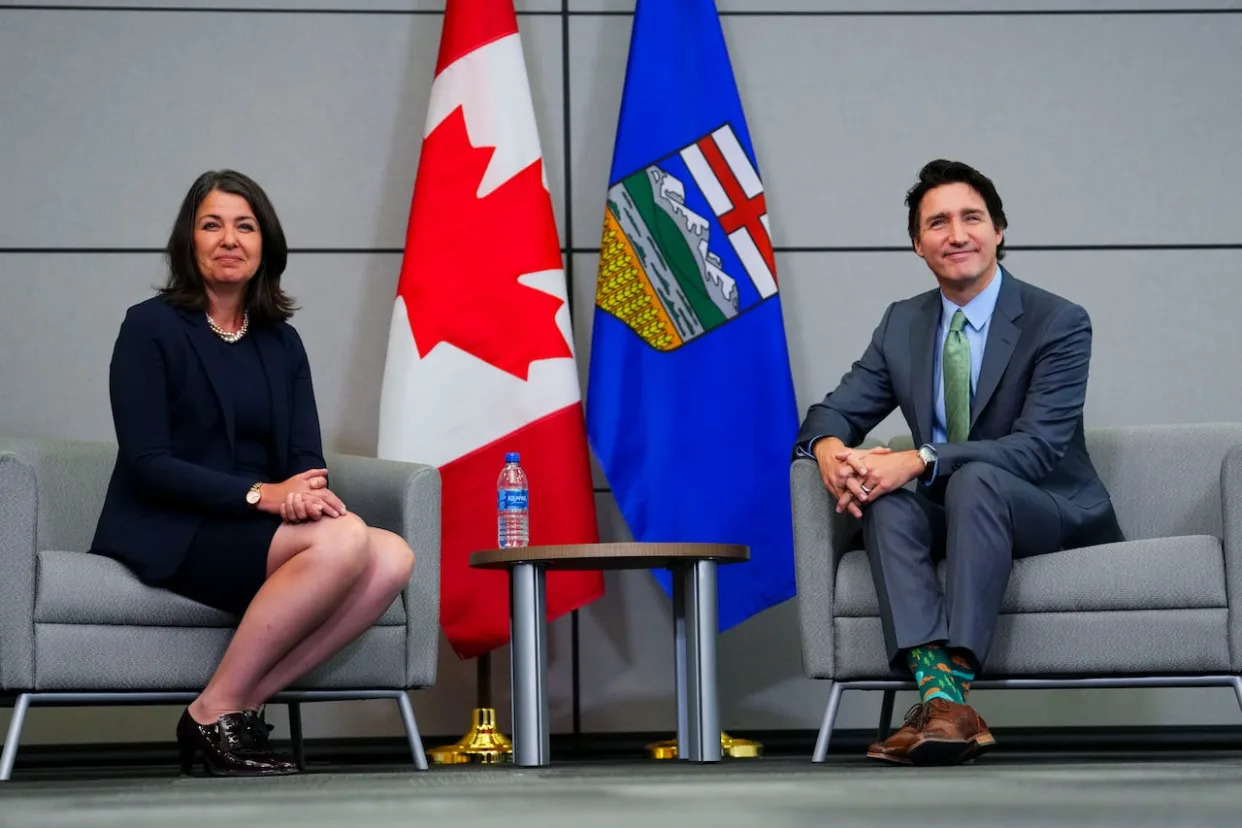
Prime Minister Justin Trudeau meets with Alberta Premier Danielle Smith in Ottawa last year. A new CBC News poll finds that standing up to the federal government matters a lot to Albertans who approve of the governing UCP. (Sean Kilpatrick/The Canadian Press - image credit)
EDITOR'S NOTE: CBC News commissioned this public opinion research in April, leading into the first anniversary of the United Conservative Party's general election win last May. The poll offers insight into how Albertans feel about Danielle Smith's UCP government and the Opposition NDP.
As with all polls, this one provides a snapshot in time.
This analysis is one in a series of articles from this research.
Danielle Smith's critics often charge the Alberta premier's constant battle with Ottawa wastes time and resources, ignores federal benefits and even backfires.
But it works from a purely political perspective — keeping United Conservative (UCP) supporters happy — according to recent CBC News polling.
"There is a real close tie between being satisfied with how the UCP government is dealing with the federal government and liking the government," said Janet Brown, who conducted the survey for CBC News.
Using a statistical analysis that estimates the relationships between policy and supporting the government, CBC's polling data predicts what issues drive overall support for the governing UCP.
Imagine all the polling data flowing through statistical software simultaneously to mathematically sort out the most meaningful — or statistically significant — issues driving satisfaction with the provincial government. The modelling reveals which issues predict the overall approval of the UCP government.
Despite the sustained controversy surrounding invoking its contentious Sovereignty Act to beat back federal clean energy regulation, floating an unpopular Alberta-only pension plan and establishing a provincial police force, analysis of the polling shows that standing up to the federal government matters a lot in the minds of Albertans who strongly or somewhat approve of the governing UCP. After honesty, it's the second biggest issue predicting support for the UCP.
Smith's constant barrage against Ottawa is a winning issue with UCP supporters, helping the governing party keep the support it had among Alberta voters last May and underscoring the good news in the poll for the governing party.
Despite a modest approval rating of 4.5 out of 10 among Alberta voters, Smith's aggressive stance against Ottawa keeps her core supporters happy.
Historically, wrestling with Ottawa works
Alberta's political leaders have waged an unrelenting war on the federal government for generations, with the most effective premiers acting as "guardians against a marauding federal government."
This political posturing works because it turns the federal government into a scapegoat, hides provincial problems such as health care and sidelines the opposition.
The notorious National Energy Program (NEP) showdown over Alberta's energy wealth in the early 1980s sparked an upswing of Western separatism and a rancorous political battle between Alberta and the feds.
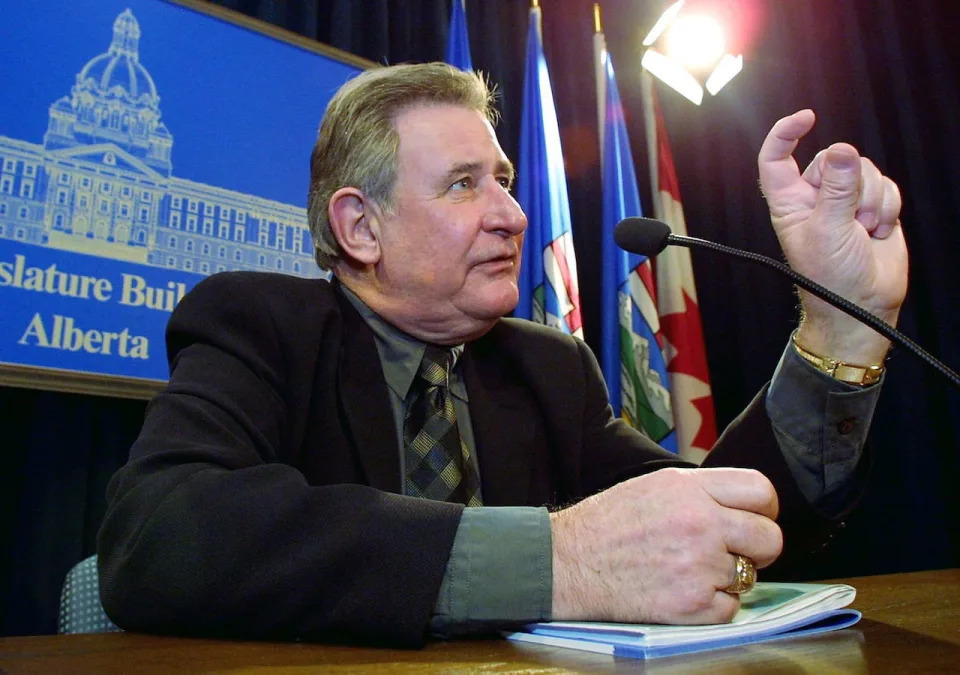
Former Alberta premier Ralph Klein was a proponent of equalization as a singular program, but he opposed equalizing other federal transfers based on need.
In battling with Ottawa, Smith is following in the steps of other Alberta premiers, including Ralph Klein. (John Ulan/The Canadian Press)
Ottawa wanted a piece of Alberta's oil wealth to help cushion the pinch of inflation.
But premier Peter Lougheed pushed back, cutting oil production by 15 per cent, tightening the supply to the rest of the country.
Fast-forward a quarter century. A different Alberta premier — this time, Ralph Klein — echoed Lougheed, telling the federal Liberals to keep their "hands off" Alberta's ballooning oil revenues.
Smith vs. Ottawa
The rinse-and-repeat cycle of Edmonton and Ottawa clashing over rights and resources persists today, with Smith making it the signature feature of her political rhetoric.
The radio call-in host turned politician came to power proclaiming, "We need less Ottawa in our lives."
While heralding the expansion of the federally owned Trans Mountain pipeline as a "game changer" that triples the flow of Alberta's oil to tidewater, critics have called out Smith for burying her thanks to Prime Minister Justin Trudeau in her public pronouncements.
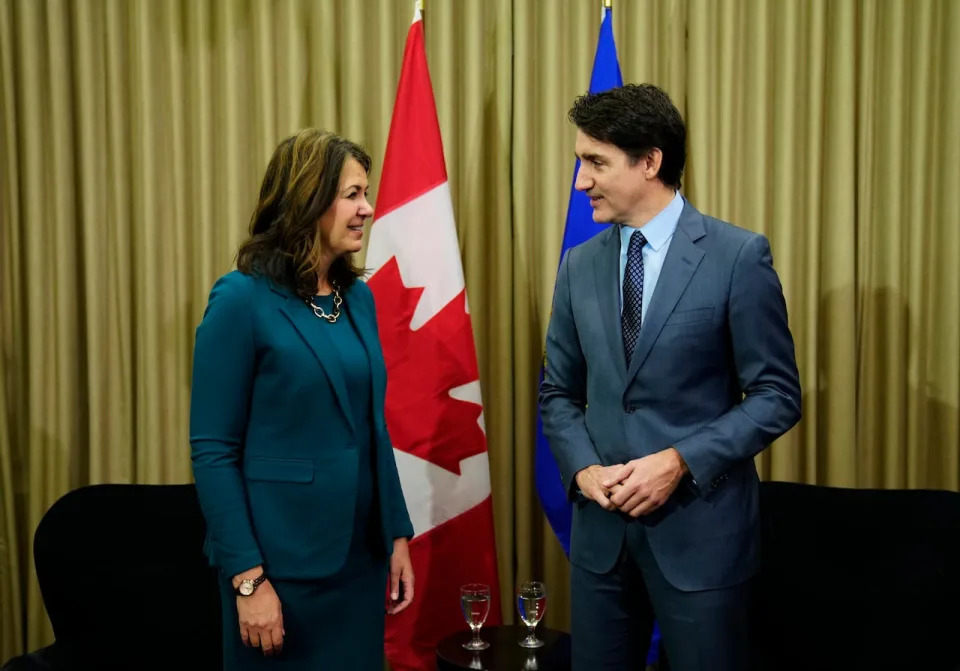
Prime Minister Justin Trudeau meets with Alberta Premier Danielle Smith in Calgary on Wednesday, March 13, 2024.
Prime Minister Justin Trudeau meets with Alberta Premier Danielle Smith in Calgary in March. Smith's constant barrage against Ottawa is a winning issue with UCP supporters. (Todd Korol/The Canadian Press)
On top of the UCP's Sovereignty Act, the centrepiece of Smith's attack on federal intrusion, the UCP introduced legislation this year to counter — even veto — deals Alberta municipalities strike with the federal government for money for transit and affordable housing.
Also this spring, the ruling UCP proposed plans to vet federal research grants to Alberta universities.
When the federal government announced plans last December to cut methane emissions from the oil-and-gas sector by three-quarters by 2030, Smith blasted the proposal as "dangerous and unconstitutional."
Earlier this month, the UCP similarly called changes to the federal Impact Assessment Act "unconstitutional," threatening to challenge the legislation in court.
While her critics decry Smith's supercharged, anti-Ottawa rhetoric, the CBC News poll suggests that UCP supporters like the premier's tough stance.
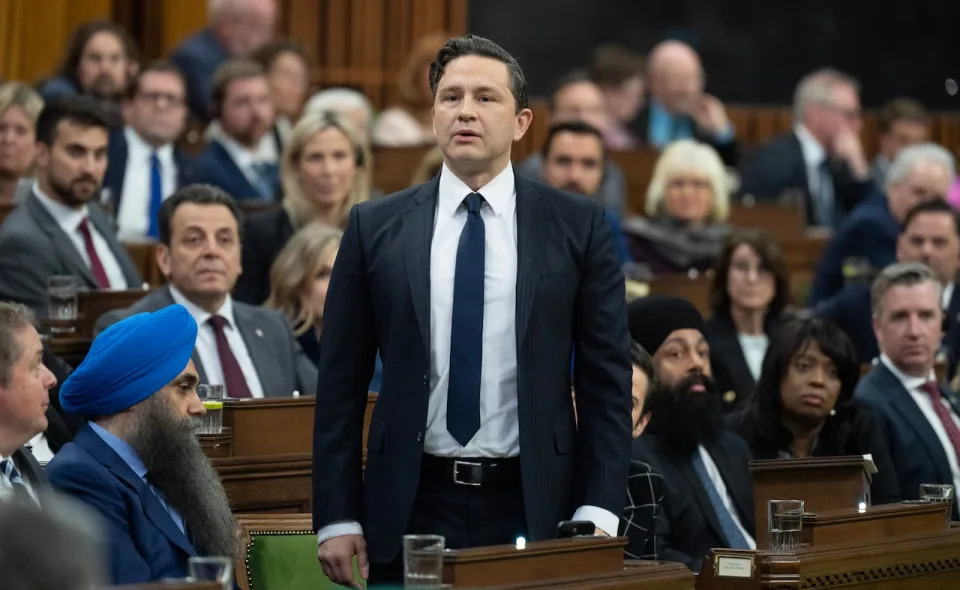
Leader of the Conservative Party Pierre Poilievre rises in response to the Speaker asking him to withdraw language during Question Period, Tuesday, April 30, 2024 in Ottawa.
Standing up to Ottawa becomes considerably more 'complex' for the UCP should Conservative Leader Pierre Poilievre's party win the next election. (Adrian Wyld/The Canadian Press)
Standing up to Ottawa is strongly correlated with overall support for the UCP. Voters who strongly or somewhat support the governing party's handling of Ottawa are 44 per cent more likely to approve of the government overall.
But Smith's heated rhetoric could be a disappointment to Albertans if, as polls suggest, Canadians fire Justin Trudeau's Liberals next year.
Bashing Ottawa works now — but might not in the future
Alberta conservatives tend to get a political boost from beating up on Ottawa when the Liberals run the federal government.
Polls suggest the Conservative Party, led by Pierre Poilievre, is on track to win a majority.
The "menace becomes less menacing" with conservatives in charge in both Ottawa and Edmonton.
Alberta premiers such as Don Getty and Jim Prentice found it challenging to get Alberta voters to blame Ottawa for the Prairie province's sluggish economy with a conservative government in power federally.
Standing up to Ottawa becomes less politically potent potentially and considerably more "complex" for the UCP with a Conservative federal government, said University of Calgary political scientist Lisa Young.
"It will be interesting to see how the Smith government adapts to that change and whether they're able to maintain that sense that they are looking out for Alberta's rights when they don't have … the foil of Justin Trudeau in Ottawa," added Young.
If the polls are correct, Smith could face a Conservative prime minister for nearly two years before heading back to the polls in the fall of 2027.
The CBC News random survey of 1,200 Albertans was conducted using a hybrid method between May 1 and 15 by Edmonton-based Trend Research under the direction of Janet Brown Opinion Research. The sample is representative of regional, age and gender factors. The margin of error is +/- 2.8 percentage points, 19 times out of 20. For subsets, the margin of error is larger.
The survey used a hybrid methodology that involved contacting survey respondents by telephone and giving them the option of completing the survey at that time, at another more convenient time, or receiving an email link and completing the survey online. Trend Research contacted people using a random list of numbers, consisting of 40 per cent landlines and 60 per cent cellphone numbers. Telephone numbers were dialed up to five times at five different times of day before another telephone number was added to the sample. The response rate among valid numbers (i.e., residential and personal) was 11.7 per cent.
Alberta UCP government limits debate on contentious bills, drawing Opposition anger
The Canadian Press
Tue, May 28, 2024
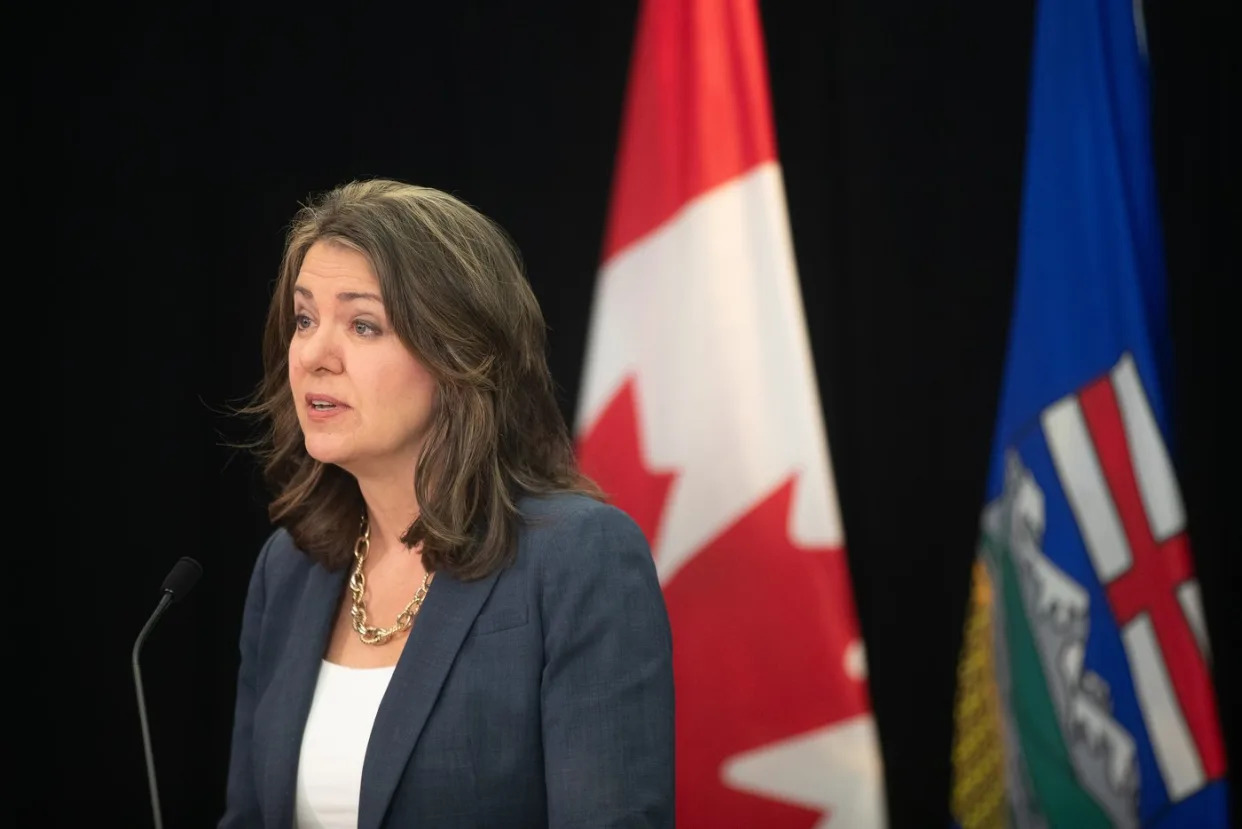
EDMONTON — Alberta’s government is limiting legislature debate time to pass four controversial bills, a tactic the Opposition New Democrats say runs roughshod over the democratic process.
With the spring sitting set to wrap up this week, Premier Danielle Smith’s United Conservative Party government is passing motions to limit debate to one hour at each stage for the bills.
The NDP said Tuesday the tactic stifles elected members who won't have a chance to voice concerns from constituents about the proposed legislation.
Three of the bills have been characterized by critics, including rural municipal leaders, as an authoritarian power grab.
One would give the province the power to veto federal funding deals with cities, towns and universities, while another would give Smith’s cabinet authority to overturn local bylaws it finds unsavoury.
NDP Leader Rachel Notley said the UCP is now pushing legislation through at a record pace.
She said the average time for debate on a bill under the NDP, and the UCP when Jason Kenney was in charge, has now dropped by half under Smith.
"She's using this legislature to consolidate power in her office."
A third bill will push provincial elections into the fall, instead of the spring, and gives more authority to the province to step in on local responses to emergencies like wildfires and droughts.
The fourth will pave the way for Smith to re-haul the public health-care system, the most expensive line in the budget, creating four new bureaucracies that report directly to her health minister.
"The consequences people will feel, and the more they feel the consequences, the more they will probably care about the fact that it was jammed through in a way that has made Alberta probably the least democratic jurisdiction in the Commonwealth," said Notley.
Among the four, the only bill the government has moved to change in response to feedback has still inspired an ad campaign against it.
Alberta Municipalities - the organization representing towns, cities and villages - confirmed Tuesday one billboard asking if Albertans were consulted on the bill is being displayed across the street from the legislature.
Government house leader Joseph Schow dismissed the Opposition's concerns, saying the NDP doesn't want to offer input on the bills and just wants them scrapped.
"The NDP has shown zero interest in helping us on legislation.”
The government used its majority in the house to reject a string of amendments proposed later Tuesday by the NDP.
However, Schow said there are other ways to get feedback from Albertans, including town halls.
"This isn't the House of Commons, we're not gonna give at least 40 hours of debate again. We're not going to let them hold it up," he said.
Schow also rejected the idea that public feedback was being ignored, even though every riding in Edmonton is represented by the Opposition.
"We have lots of stakeholders that we meet with regularly here in Edmonton, whether they support us or not," he said.
Since the UCP took power under Kenney in 2019, the special time limit has been invoked 54 times, compared to four times under the NDP’s four-year mandate.
The government is now on pace to use the power 18 times this session, since Smith won last year's election.
The legislature sitting is scheduled to finish Thursday, but it could see members break for the summer as early as Wednesday.
This report by The Canadian Press was first published May 28, 2024.
The Canadian Press
The Canadian Press
Tue, May 28, 2024

EDMONTON — Alberta’s government is limiting legislature debate time to pass four controversial bills, a tactic the Opposition New Democrats say runs roughshod over the democratic process.
With the spring sitting set to wrap up this week, Premier Danielle Smith’s United Conservative Party government is passing motions to limit debate to one hour at each stage for the bills.
The NDP said Tuesday the tactic stifles elected members who won't have a chance to voice concerns from constituents about the proposed legislation.
Three of the bills have been characterized by critics, including rural municipal leaders, as an authoritarian power grab.
One would give the province the power to veto federal funding deals with cities, towns and universities, while another would give Smith’s cabinet authority to overturn local bylaws it finds unsavoury.
NDP Leader Rachel Notley said the UCP is now pushing legislation through at a record pace.
She said the average time for debate on a bill under the NDP, and the UCP when Jason Kenney was in charge, has now dropped by half under Smith.
"She's using this legislature to consolidate power in her office."
A third bill will push provincial elections into the fall, instead of the spring, and gives more authority to the province to step in on local responses to emergencies like wildfires and droughts.
The fourth will pave the way for Smith to re-haul the public health-care system, the most expensive line in the budget, creating four new bureaucracies that report directly to her health minister.
"The consequences people will feel, and the more they feel the consequences, the more they will probably care about the fact that it was jammed through in a way that has made Alberta probably the least democratic jurisdiction in the Commonwealth," said Notley.
Among the four, the only bill the government has moved to change in response to feedback has still inspired an ad campaign against it.
Alberta Municipalities - the organization representing towns, cities and villages - confirmed Tuesday one billboard asking if Albertans were consulted on the bill is being displayed across the street from the legislature.
Government house leader Joseph Schow dismissed the Opposition's concerns, saying the NDP doesn't want to offer input on the bills and just wants them scrapped.
"The NDP has shown zero interest in helping us on legislation.”
The government used its majority in the house to reject a string of amendments proposed later Tuesday by the NDP.
However, Schow said there are other ways to get feedback from Albertans, including town halls.
"This isn't the House of Commons, we're not gonna give at least 40 hours of debate again. We're not going to let them hold it up," he said.
Schow also rejected the idea that public feedback was being ignored, even though every riding in Edmonton is represented by the Opposition.
"We have lots of stakeholders that we meet with regularly here in Edmonton, whether they support us or not," he said.
Since the UCP took power under Kenney in 2019, the special time limit has been invoked 54 times, compared to four times under the NDP’s four-year mandate.
The government is now on pace to use the power 18 times this session, since Smith won last year's election.
The legislature sitting is scheduled to finish Thursday, but it could see members break for the summer as early as Wednesday.
This report by The Canadian Press was first published May 28, 2024.
The Canadian Press
Alberta UCP wraps spring legislature sitting marred by accusations of overreach
The Canadian Press
Wed, May 29, 2024
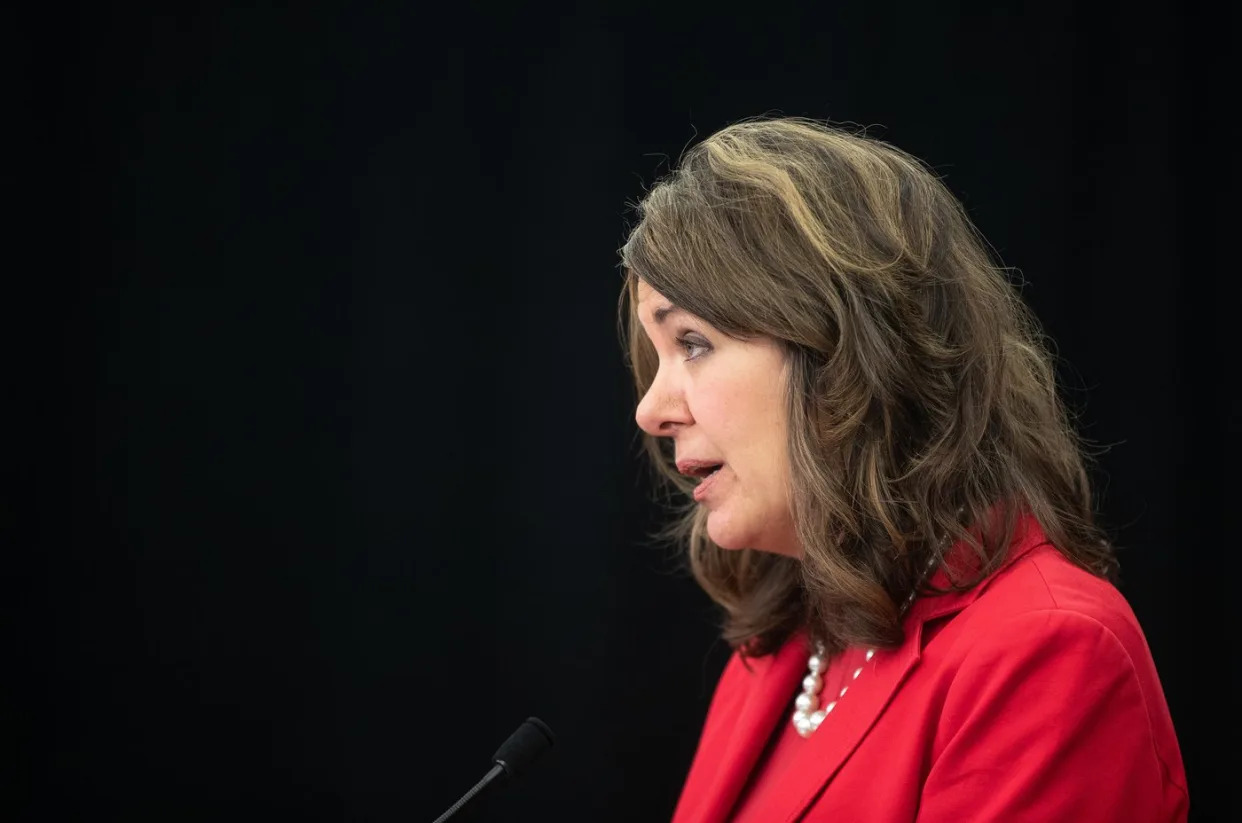
EDMONTON — Alberta Premier Danielle Smith's government capped off the spring legislature sitting Wednesday after passing bills slammed by critics as an undemocratic power grab.
One proposed law, which would give the United Conservative Party government the ability to overturn municipal bylaws, passed debate in the house shortly before members adjourned for the summer.
Backlash from municipalities about the bill going too far spurred the UCP to make amendments and claw back a plan for cabinet to be able to quickly fire mayors and councillors.
When the bill officially becomes law, the government would have to call for a local recall vote.
The widespread criticism didn't stop with the amendments.
Municipal leaders have said the changes don’t provide guardrails to prevent the province from strong-arming municipal decision-making.
Alberta Municipalities launched on Tuesday an ad campaign against the bill, including a billboard near the legislature building.
Municipal Affairs Minister Ric McIver has defended the bill and pointed to a clause in it that would remove property taxes to incentivize affordable housing.
"It's a good bill," he said.
The fast pace of the final weeks of the sitting drew condemnation from Opposition New Democrats. They accused the government of ramming through four contentious bills as quickly as possible, limiting the opportunity of members to voice concerns from constituents.
The NDP said the government ran roughshod over the democratic process by using motions to limit debate time to one hour at each debate stage.
NDP Leader Rachel Notley said Smith, with the municipalities bill, is giving her government the ability to intimidate and bully any local officials who might stand up publicly against it.
“It doesn’t respect the democratic will of the people. This is a government that thinks that it can just make decisions on its own with no regard to the opinions of Albertans or, quite frankly, the truth,” Notley said.
Government house leader Joseph Schow defended the use of time limits, saying the Opposition has neither supported the bills nor offered constructive criticism.
"We got a lot of good bills through," Schow said of the UCP's first 12 months in office.
The last bill of the sitting to get the stamp of approval from UCP legislators later Wednesday would pave the way for Smith to restructure the public health-care system and create four new governing bureaucracies that report to Health Minister Adriana LaGrange.
Legislation passed earlier this week would push provincial elections into the fall, instead of the spring, and give more authority to the government to step in on local emergency responses, like wildfires and droughts.
Another bill would give the province the power to veto federal funding for cities, towns and universities.
That bill has sparked concern the province will interfere with academic freedom and free speech from student and faculty groups.
The sitting came to a close against a backdrop of provincewide protests against the UCP, pushback from Pride groups over proposed rules for transgender youth and an NDP leadership race to replace Notley.
With NDP members set to choose a new leader June 22, Wednesday marked the last day Notley stood in the house as the leader of the Opposition.
This report by The Canadian Press was first published May 29, 2024.
Lisa Johnson, The Canadian Press
No comments:
Post a Comment